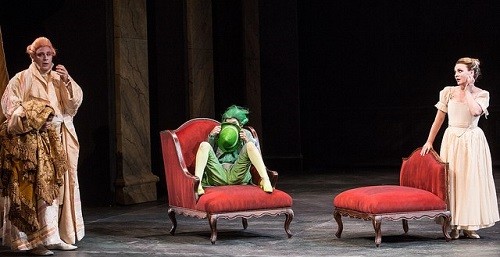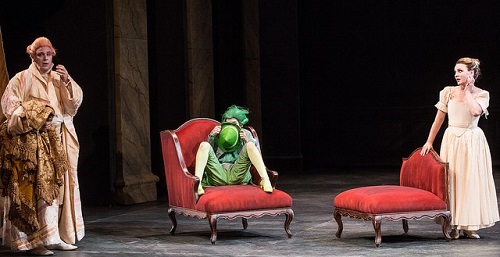 Spain Mozart, Le nozze di Figaro: Easo Choir, Orquesta de Euskadi / Yi-Chen Lin (conductor), Kursaal, San Sebastian, 13.8.2017. (JMI)
Spain Mozart, Le nozze di Figaro: Easo Choir, Orquesta de Euskadi / Yi-Chen Lin (conductor), Kursaal, San Sebastian, 13.8.2017. (JMI)

Cast:
Figaro – Simón Orfila
Susanna – Katerina Tretyakova
Countess – Carmela Remigio
Count – Lucas Meachem
Cherubino – Clara Mouriz
Don Bartolo – Valeriano Lanchas
Marcellina – Marina Rodríguez-Cusí
Don Basilio – Juan Antonio Sanabria
Don Curzio – Gerardo López
Antonio – Fernando Latorre
Barbarina – Belén Roig
Production: Festival dei Due Mondi, Spoleto
Director – Giorgio Ferrara
Sets – Dante Ferretti, Francesca Lo Schiavo
Costumes – Mauricio Galante
Lighting – A. J. Weissbard
This production, which originated at the Spoleto Festival, essentially has no sets, just a drape at the back of the stage and one which represents a theatre curtain at the front. Everything else is props, apart from a projection in Act IV that alludes to the garden. Thus there is an armchair and a folding screen in Act I, a bed and that screen again in the second, two large armchairs in Act III and nothing in the last act. The costumes are colourful but the characters wear rather bizarre wigs. With this type of minimalist production the stage direction is very important, and it was not remarkable here; the chorus’s movements were especially poor.
Lightness and joy are fundamental in this Mozart opera, and it requires an excellent conductor. Unfortunately, I did not find Yi-Chen Lin’s leadership convincing. In general, what the conductor is going to offer the audience is clear from the overture; this was fairly lifeless and the tempos were too slow, and so it continued for the rest of the opera. Her conducting was best in Act II, but flat and often tedious during the rest of opera. She was always in control, and the orchestra gave a correct performance, but one missed more inspiration. I was also disappointed in the Easo Choir.
The best singing of the evening came from soprano Katerina Tretyakova in the role of Susanna. Her performance was completely satisfying, in terms both of singing and acting, particularly in her last act aria, ‘Deh, vieni non tardar’.
Figaro was played by bass-baritone Simón Orfila, who continues to be a solid interpreter of the character, whether or not his voice appeals to everyone.
Italian soprano Carmela Remigio was not well suited to part of the Countess. Her voice offered little contrast to Susanna’s, which was really noticeable in their Act III duet. In addition, her vibrato was excessive, especially in her interpretation of ‘Porgi amor’. She did better at ‘Dove sono’ but overall fell short.
Baritone Lucas Meachem’s Count Almaviva was too buffo in this staging. Mr. Meachem’s voice is ample, but his singing was monotonous, and he has a tendency to open sounds. His Act II aria had a little Mozartian ending, which seemed to be asking for easy applause.
Local mezzo-soprano Clara Mouriz did well in the part of Cherubino (though with little help from the production). Her two arias were correctly interpreted, and she moves comfortably about the stage.
The secondary characters were not generally impressive, but Don Curzio was well served by Gerardo López and Belén Roig was an acceptable Barbarina.
José M. Irurzun
